Biogeochemistry
Biogeochemistry
 Laura Farías (Universidad de Concepción)
Laura Farías (Universidad de Concepción)
Dr. Farías is an Associate Professor at the Department of Oceanography, University of Concepción. She is Oceanographer (Argentina) and got a PhD in Oceanography at Concepcion University in 1998. Her current research is focuses on the understanding of the biogeochemical processes involved in the cycling of greenhouse gases, particularly nitrous oxide (N2O). Her work has shown how oxygen concentration affects processes such as denitrification and nitrification in the cycling of N2O in oxygen minimum zones. She has also built and reported on one of the first marine time-series of N2O and CH4 in the world. These time series studies are widely recognized as fundamental research efforts to assess ocean variability and responses to natural perturbations. Her results are helping to understand the processes that explain the temporal variability (monthly to inter-annual) of N2O fluxes across the seawater interface in coastal waters. More recently, she is has also focused on processes involved in the cycling of methane and dimethylsulfide. She is also the head of the isotopic ratio mass spectrometry facilities at U. of Concepción. Dr. Farías is the current Chilean representative for the international Surface Ocean – Lower Atmosphere Study (SOLAS) project.
E-Mail: lfarias@profc.udec.cl | Página Personal
- Dr. Ricardo De Pol, Universidad de Concepción (Alterno)
- Dra. Beatriz Diez, Universidad Católica (Asociada)
- Dr. Roberto Rondanelli, Universidad de Chile (Asociado)
- Dr. Italo Masotti, Universidad de Valparaíso (Adjunto)
- Dra. Eugenia Gayó (Adjunta)
- Mariela Yévenes, Universidad de Concepción (PostDoctoral)




